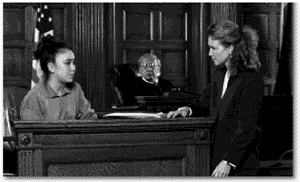|
First Defense Legal Aid
First Defense Legal Aid [FDLA] gives youth support, safety, and security and teaches the element of trust, as they can now trust adults when [they] go in front of the juvenile justice system. They feel that their rights and their privileges will be protected when they see someone from FDLA at the police station.
-- Earl Williams, Chicago child advocate
 For defense attorneys, being able to intervene at the arrest and interrogation of a client can make a critical difference in the case. However, public defenders in States like Illinois are prohibited from representing defendants until their initial appearance before the court to determine indigency. First Defense Legal Aid bridges this gap by providing fast, free legal advice at the police station immediately after arrest and until a public defender is assigned.
For defense attorneys, being able to intervene at the arrest and interrogation of a client can make a critical difference in the case. However, public defenders in States like Illinois are prohibited from representing defendants until their initial appearance before the court to determine indigency. First Defense Legal Aid bridges this gap by providing fast, free legal advice at the police station immediately after arrest and until a public defender is assigned.
FDLA provides legal aid to residents of Cook County, IL. No income requirements are involved. During business hours, staff attorneys respond to calls and immediately meet with callers at the police station to advise them of their rights. During evenings and weekends, a bilingual answering service notifies volunteer attorneys of calls through a paging system. Volunteer attorneys agree to attend a training workshop and to work a minimum of one 15-hour shift per month.
FDLA attorneys collect vital information about the clients and the nature of the alleged offenses. FDLA also ensures that detainees' critical needs, such as access to medication, are met and that any violations that may have occurred while they were in police custody are documented. This recordkeeping benefits both the defendants and the police. FDLA's records can be relied on both to protect police officers from false allegations of physical abuse and to document incidents of police brutality.
The hotline averages 5-10 calls each day, with the attorneys performing many additional functions, such as offering advice about the criminal justice system over the phone, helping people find family members who have been taken into custody by the police, and making police station visits. Many calls come from young people or their parents. According to FDLA's director, "Many times we get calls from distraught parents. They don't know where their kids are, and they don't know what to do. We find out where the kid is and act as a liaison between the parent and child."
FDLA also works to educate the public, reaching out through street law programs, public service announcements, social workers, halfway houses, and other agencies. FDLA receives a great deal of word-of-mouth publicity, which it sees as a sign that "our clients have faith in us and trust us."
 |
| Innovative Approaches to Juvenile Indigent Defense |
Juvenile Justice Bulletin
· December 1998 |
|